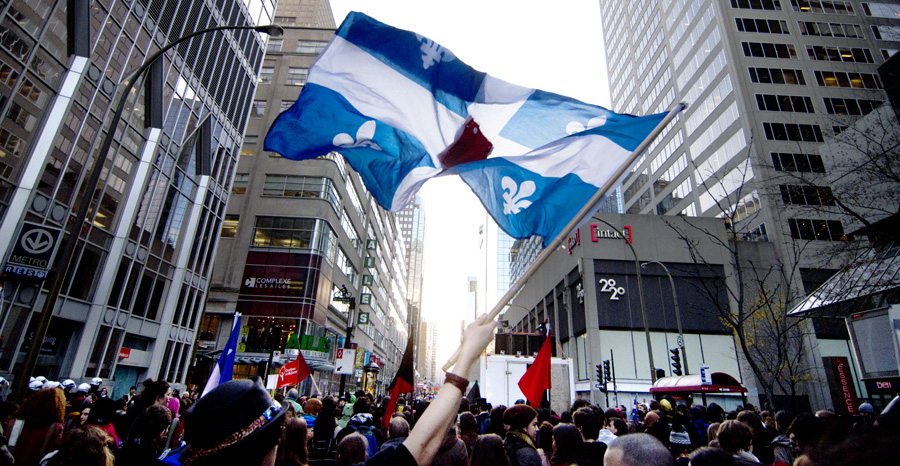On Nov. 22, students gathered in Montreal to protest in favour of free tuition and show their solidarity for student causes across the world. The protest was part of a global education strike week organized by the International Student Movement, a coordination platform for student mobilization worldwide. As part of the movement, 60,000 students across Quebec voted for strikes that varied in length from one day to the entire week, lasting from Nov. 14 to Nov. 22.
The protest was organized by the Association pour une solidarité syndicale étudiante (ASSÉ), one of the largest student groups in Quebec. ASSÉ helped to coordinate last year’s student strikes against the former provincial Liberal government’s proposed tuition increases.
ASSÉ spokesperson Jérémie Bédard-Wien emphasized the importance of connecting Quebec students with other student movements around the world, especially now that the Parti Québécois (PQ) has repealed the tuition increases.

“Many movements have used us as an example of a successful struggle against tuition increases,” he said. “These movements showed us tremendous solidarity last spring, as we were facing police brutality, exclusion, and political repression. It is a chance for us today to say thank you to these movements, and demonstrate our solidarity with theirs.”
According to the International Student Movement’s website, the movement was endorsed by over 100 groups in 36 countries.
“We’re nearing a point where we’re able to effectively share tactics, [and] share methods of organization in order to make all of our movements better and more effective,” Bédard-Wien said.
Students’ Society of McGill University Vice-President External Robin Reid-Fraser attended the protest with a small group of McGill students.
“It’s so important to remember that this kind of struggle is happening all over the world, and to show that we have these ways of creating connections and showing that solidarity, especially since the police response in many other places can be even more severe than here in Quebec,” she said.
Starting at Victoria Square, the protest wound through downtown Montreal, before ending at Parc Émilie Gamelin. Although the Service de police de la Ville de Montréal (SPVM) declared the protest illegal because the organizers did not disclose their planned route, SPVM announced that they would allow the protest to continue as long as no criminal acts were committed. No arrests were made.
Bédard-Wien emphasized that free education will continue to be the theme of ASSÉ’s campaign as the organization looks towards the provincial education summit that the PQ is planning for February.

“We want the summit to be a place [where] the university community as a whole [can meet], and not [just] economic elites,” he said. “We also want the summit to be a place where we can talk about the fundamental orientations of our education system.”
On Nov. 8, ASSÉ submitted several requests to the provincial government about the way the summit will be run. These included the concern that the chosen themes of discussion do not allow for a conversation about the mission of educational institutions.
Last Sunday, ASSÉ announced that they will participate in the summit, despite not having received a response from the government regarding these requests. The organization will also hold a protest during the summit, however, and will leave the discussions they feel decisions have been made in advance.
At the Nov. 22 protest, many students expressed concerns over the effectiveness of the upcoming education summit. Thomas Sallá, a student at Le cégep du Vieux Montréal, said he hopes the education summit can be an effective way of addressing student issues. However, he emphasized that continued student mobilization is necessary to keep pressure on the government.
“I hope we’ll keep this level of mobilization, because we can accomplish great things by staying ready to go back in the streets,” Sallá said. “I hope we’ll keep this fighting spirit.”









